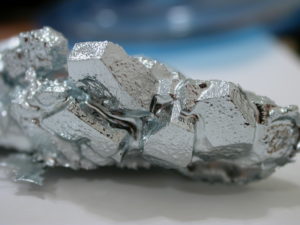Gallium is a chemical element with symbol Ga and atomic number 31. It is in group 13 of the periodic table, and thus has similarities to the other metals of the group, aluminium, indium, and thallium.
Contents
Uses
- Although gallium has no natural function in biology, gallium ions interact with processes in the body in a manner similar to iron(III). Because these processes include inflammation, a marker for many disease states, several gallium salts are used (or are in development) as pharmaceuticals and radiopharmaceuticals in medicine.
Benefits
- Gallium is an element found in the body, but it occurs in a very small amount. For example, in a person with a mass of seventy kilograms, there are 0.7 milligrams of gallium in the body. If this amount of gallium was condensed into a cube, the cube would only be 0.49 millimeters long on one side. It has no proven benefit towards the function of the body, and it most likely is only present due to small traces in the natural environment, in water, and in residue on vegetables and fruits.
- Several vitamins and commercially distributed waters have been known to contain trace amounts of gallium with less than one part per million. Pure gallium is not a harmful substance for humans to touch. It has been handled many times only for the simple pleasure of watching it melt by the heat emitted from a human hand.
- However, it is known to leave a stain on hands. Even the gallium radioactive compound, gallium [67Ga] citrate, can be injected into the body and used for gallium scanning without harmful effects. Although it is not harmful in small amounts, gallium should not be purposefully consumed in large doses.
- Some gallium compounds can actually be very dangerous, however. For example, acute exposure to gallium(III) chloride can cause throat irritation, difficulty breathing, chest pain, and its fumes can cause even very serious conditions such as pulmonary edema and partial paralysis.
Cautions
- Using gallium with other medicines that may harm the kidneys (eg, aminoglycosides [eg, gentamicin], amphotericin B) may increase your risk of developing severe kidney problems. Make sure you notify your health care provider of any other medicines that you are taking before using this one.
Interactions
Unknown, please consult with your doctor.
Other names
Ganite
References
Source: Wikipedia, https://en.wikipedia.org/wiki/Gallium
Image source: By en:user:foobar – Own work, CC BY-SA 3.0, https://commons.wikimedia.org/w/index.php?curid=12703
Lenntech, http://www.lenntech.com/periodic/elements/ga.htm
Drugs.com, https://www.drugs.com/cdi/gallium.html

